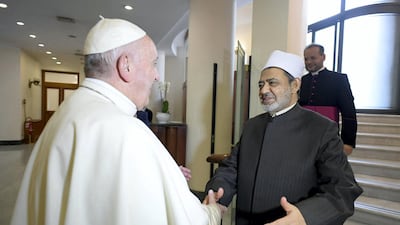Religious leaders of different faiths will gather under one roof in Abu Dhabi next week for peaceful dialogue on how to end violence worldwide.
The Global Conference for Human Fraternity will begin on February 3, to coincide with the inaugural visit of Pope Francis to the UAE.
Sheikh Ahmed Al Tayeb, the Grand Imam of Al Azhar, the highest religious authority in the Muslim world, will join him as well as prominent intellectual and media personalities in discussions on the importance of global tolerance and acceptance.
Dr Sultan Al Remeithi, secretary general of the Muslim Council of Elders, the organisers of the two-day conference, said it would serve as “an intellectual forum to enable us to listen to the voice of reason and wisdom in human interactions regardless of one’s race and religious identity.
“It will also reinforce the concepts of citizenship and peaceful coexistence among communities.
"The conference will highlight the importance of tolerance as the basis of dialogue and acceptance among diverse communities to achieve the common aspirations of mankind with dignity and compassion," he said.
Held under the patronage of Sheikh Mohamed bin Zayed, Crown Prince of Abu Dhabi and Deputy Supreme Commander of the Armed Forces, the conference will involve “knowledge sessions” focusing on an array of themes. The first session, titled Principles of Human Fraternity, will examine the best ways to promote a culture of peace in areas of violence and ideological and ethnic extremism. This will be achieved by looking at ways to confront religious extremism.
The second session, titled Common Responsibility to Achieving Human Fraternity, will explore ways to strengthen bonds of co-operation between East and West to achieve world peace.
The session will also highlight the role of religious, educational, cultural and media organisations in promoting fraternity in society through conducting regular awareness campaigns.
And the third session, Human Fraternity: Challenges and Opportunities, will outline ways to direct human conscience and religious ethics to address causes of violence such as selfishness, religious intolerance and hatred.
Delegates from a variety of religions and sects from across the world are expected to attend the conference.
Joseph Gébara, Archeparch of the Melkite Greek Catholic Archeparchy of Petra and Philadelphia in Amman, Jordan, on Sunday said he was confident the visit by the Head of the Catholic Church to the UAE would have a positive overall influence, especially in terms of religious dialogue, social unity and the rejection of hatred and extremism.
"We expect the visit to close gaps and reinforce the unity between Christianity and Islam, especially in terms of fighting poverty, oppression, ignorance, human exploitation and trafficking, and promoting peace in all countries, especially Arab countries," he told state news agency, Wam.
"We are confident that the Pope will be among his family during his visit to the UAE, as being accompanied by Arab Christians reflects the hospitality of the Emirati people and the generosity of the UAE’s wise leadership and officials.”


